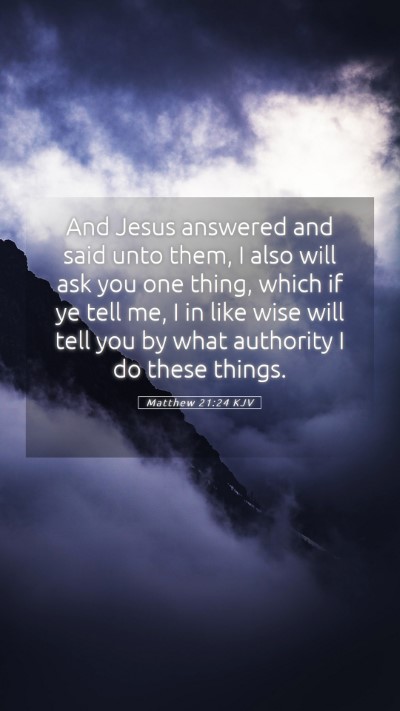Understanding Matthew 21:24
Verse: "And Jesus answered and said unto them, I also will ask you one thing, which if ye tell me, I in like case will tell you." (Matthew 21:24)
Overview: This verse occurs during a significant confrontation between Jesus and the religious leaders of His time. Matthew 21 is pivotal in the narrative of Christ’s ministry, displaying His authority and challenging the established religious order.
Bible Verse Meanings and Interpretations
This scripture presents a profound teaching moment, highlighting the method by which Jesus engages with those who question His authority. By asking a counter-question, Jesus invites a deeper reflection on their understanding and motives.
Key Themes
- Authority of Jesus: The passage underscores the authority with which Jesus operates, positioning Himself above the traditional religious leaders.
- Counter-questioning: By responding to a question with another question, Jesus not only deflects their challenge but also exposes the insincerity of their inquiry.
- Challenge to Intellect: This method encourages those in authority to think critically about their beliefs and the implications of their questions.
Insights from Public Domain Commentaries
Matthew Henry's Commentary
Matthew Henry emphasizes that Jesus’ question was aimed at revealing the leaders’ inability to grasp the truth about His ministry. By posing a question about John the Baptist’s authority, He forces them into a dilemma where they must confront their own understanding and belief.
Albert Barnes' Notes
Albert Barnes points out that the nature of Jesus’ response indicates a masterful technique of debating where the purpose is not just to answer, but to lead the questioners to self-examination. It also serves to expose the leaders’ reluctance to acknowledge the truth of John’s baptism.
Adam Clarke's Commentary
Adam Clarke highlights the significance of the mutual questioning dynamic. He notes that by not directly answering the inquiry about His authority, Jesus emphasizes that understanding divine authority requires personal revelation and discernment.
Scripture Analysis and Commentary
The interaction encapsulates a broader spiritual teaching: the importance of humility and readiness to accept divine truth. The leaders’ hesitation not only reveals their agenda but also serves as a warning against spiritual pride.
Cross References
- Matthew 21:25 - Discusses the authority of John's baptism.
- Luke 20:3 - Similar account of Jesus’ questioning.
- Mark 11:29 - Further emphasis on the challenge to Jesus’ authority.
Application of Matthew 21:24
This verse invites readers to reflect on their own responses to spiritual questions. It asks individuals to consider the depth of their understanding of authority in their faith and encourages constructive dialogue about theological concepts.
Personal Reflection Questions
- How do I respond when my beliefs are challenged?
- Do I approach questions of faith with sincerity and openness?
- What can I learn from Jesus’ example of inquiry and dialogue?
Conclusion
Matthew 21:24 is a call to deeper understanding and self-examination. It showcases Jesus’ ingenuity in teaching and reveals the importance of humility in seeking truth, inviting each reader to participate in an ongoing dialogue about faith, authority, and the nature of divine revelation.
This verse, and the broader context of Matthew 21, is essential for anyone exploring Bible verse meanings, Bible verse interpretations, and Bible study insights. By engaging deeply with such passages, one can uncover rich layers of understanding that apply to personal faith and community discussions on spirituality.


